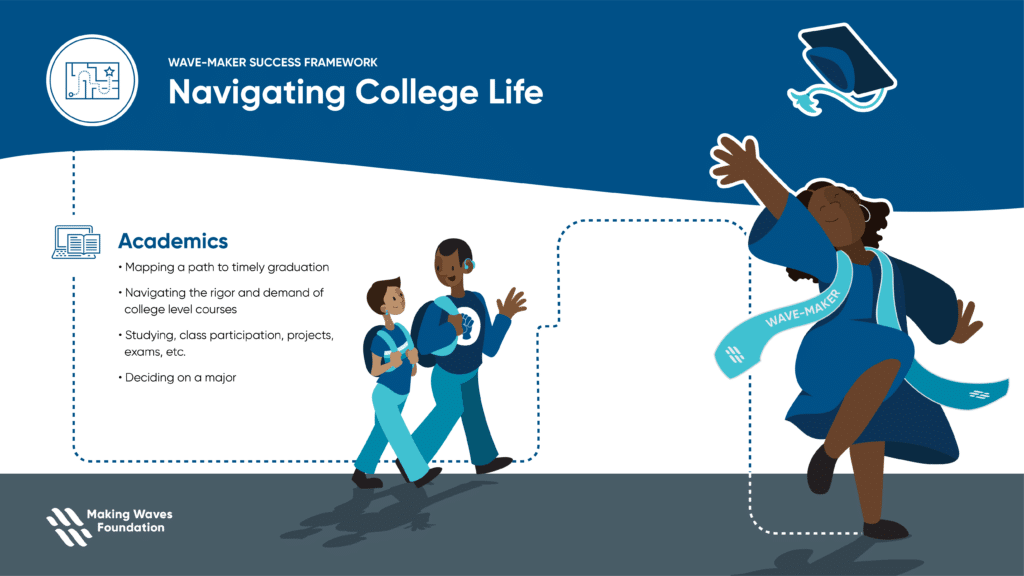
Navigating College Life: Academics

Mapping a path to timely graduation
You did it! You were accepted to the college of your dreams and now you’re ready to take on the world. But before you can do that, you have to actually finish college. And while that may seem like a daunting task, there are things you can do to set yourself up for success and ensure that you graduate on time.
1. Choose the right degree program
The first step to graduating on time is making sure you’re in the right degree program. If you’re unsure of what you want to study, that’s okay!
Talk to your academic advisor about your interests and they can help steer you in the right direction. Start by creating a schedule for yourself and mapping out exactly what classes you need to take and when you need to take them. This will help you stay on track and make sure that you’re taking the right classes at the right time. Once you’ve declared a major, do your best to stick with it. Changing majors can often add an extra semester or two onto your degree timeline.
2. Take advantage of summer classes
If you’re looking to lighten your course load during the fall and spring semesters, consider taking some classes during the summer. Summer classes can be a great way to get ahead and take care of some of your general education requirements. Just be sure not to overdo it – you still want to enjoy your summer break!
3. Get involved on campus
Being involved in extracurricular activities is a great way to make friends and get involved in the college community. But did you know that getting involved can also help you graduate on time? It’s also important to get involved on campus and connect with your professors and classmates. These relationships can help create a support system that will see you through tough times and help you stay motivated.
So go ahead and join that club or sign up for that intramural sport – your future self will thank you!
Of course, there will be times when things don’t go according to plan. Maybe you’ll get sick or have a family emergency that throws off your schedule. That’s why it’s important to be flexible and willing to adjust your plans as needed. The most important thing is that you don’t get discouraged and give up on your goal of graduating on time.
Graduating from college is a major accomplishment, but it’s not always easy. By mapping out a plan and staying focused, you can increase your chances of success and ensure that you walk across that stage in a few years with your head held high. So what are you waiting for? It’s time to get started!
Navigating the rigor and demand of college level courses
If you’re like most college students, you’re probably feeling a little overwhelmed right about now. Midterms are looming and there’s just so much material to cover! How are you ever going to make it through all of this without pulling your hair out?
Never fear, help is here! These tips will help you stay on top of your coursework so you can get good grades and still have time for a social life:
1. Get organized
The first step to conquering a huge workload is to get yourself organized. Make a schedule of when you’re going to study for each class and stick to it. Dedicate certain days of the week to certain subjects and make sure you give yourself enough time to review the material before the test.
2. Create a study group
A great way to stay on top of your coursework is to create a study group with some of your classmates. You can help each other out when you’re stuck on a problem and quiz each other before exams. Just make sure you choose classmates who are serious about their studies!
3. Get enough sleep
This one might seem like a no-brainer, but it’s important to get enough sleep when you have a lot of work to do. You’ll be able to focus better and retain information more easily if you’re well-rested. So make sure you get at least 8 hours of sleep every night during midterms season.
4. Take breaks
When you’re studying for long periods of time, it’s important to take breaks every once in a while or else you’ll start to feel burnt out. Go for a walk, watch an episode of your favorite TV show, or just take 10 minutes to relax and clear your mind before getting back to work.
5. Ask for help when you need it
Don’t be afraid to ask your professor or TA for help if you’re having trouble with the material. They’ll be more than happy to help you out and they might even have some extra resources that can help you understand the concepts better.
Midterms season can be tough, but if you follow these tips, you’ll be able to power through all your coursework with ease! Just remember to stay organized, create a study group, get enough sleep, take breaks, and ask for help when needed and you’ll be on your way to success!
Studying, class participation, projects, exams, etc.
When you think about college, what comes to mind? If you’re like most people, you probably think of studying, classes, and exams. But there’s one important aspect of college that often gets overlooked: class participation.
Believe it or not, participating in class can actually be beneficial for you in a number of ways.
- For starters, it can help you better understand the material. When you’re actively engaged in the discussion, you’re more likely to pay attention and retain the information.
- Additionally, participating in class can help you develop critical thinking and communication skills.
- And last but not least, it can give you a chance to build relationships with your professors and classmates.
If you’re not used to participating in class, it can be intimidating at first. But there are a few things you can do to make it easier on yourself.
- First of all, try to sit near the front of the classroom so that you’re less likely to get lost in the discussion.
- Additionally, make sure you’ve done the reading before coming to class so that you’re prepared to contribute.
- And last but not least, don’t be afraid to raise your hand and ask questions—even if they seem silly. Remember, everyone was new to this once!
Class participation might not be at the top of your list of priorities, but it’s actually worth your time and effort. So next time you’re tempted to skip class or sit in the back row without saying a word, remember that there are some real benefits to participating.
Deciding on a major
If you’re in college, chances are you’ve been asked the question, “What’s your major?” more times than you can count. And if you’re like most students, you probably don’t have a great answer. That’s because picking a major is a big decision — one that can feel both exciting and daunting at the same time. But don’t worry, we’re here to help.
Here are four steps to help you choose a major that’s right for you:
1. Do some soul searching
The first step in choosing a major is to do some soul searching. What are your interests? What are your passions? What subjects did you like (or not like) in high school? Answering these questions will help give you some direction and narrow down your choices.
2. Research your options
Once you have an idea of what you might want to study, it’s time to start doing some research. Talk to your parents, teachers, and friends who might be able to offer some insight.
Look up information about different majors online. And most importantly, talk to your guidance counselor. They’ll be able to tell you about different majors and help connect you with resources that can answer any remaining questions you have.
3. Consider your career goals
Choosing a major is not just about picking a subject that interests you; it’s also about choosing a field that will lead to a career you’ll love. So, as you’re researching different majors, think about what kind of job you see yourself doing after graduation. Will your chosen major help get you there?
4. Make your decision and move forward
Making a decision can be hard, but at some point, you just have to go for it. Trust your gut and pick the major that feels right for you. And remember, even if you change your mind later on, that’s OK too. The most important thing is that you’re taking the first step toward achieving your goals.
Picking a college major can feel like a daunting task, but it doesn’t have to be. By doing some soul searching, researching your options, considering your career goals, and trusting your gut, you can choose a major that’s right for you. So go out there and make the best decision for yourself—you’ve got this!
Co-authored with AI
Making Waves Education Foundation generated this text in part with artificial intelligence. Content has been reviewed, edited, and revised to our organization’s liking and we take ultimate responsibility for the content of this publication.
About Making Waves Education Foundation
At Making Waves, we are committed to educational equity. Making Waves Education Foundation is a Bay Area nonprofit that supports Making Waves Academy – a public charter school with more than 1,100 5th through 12th grade students – and leads college and career programming with more than 430 college students.
Knowing the opportunities that come with a college degree, we partner with historically underrepresented and underserved students to help make college affordable and graduation attainable. Centering the journeys of our students, our personalized approach includes college and career coaching, scholarships, and financial planning.
Our alumni network includes more than 730 college graduates, who earn their degrees and land jobs at more than twice the rate of their first-generation, low-income peers, with 85% graduating debt-free.







